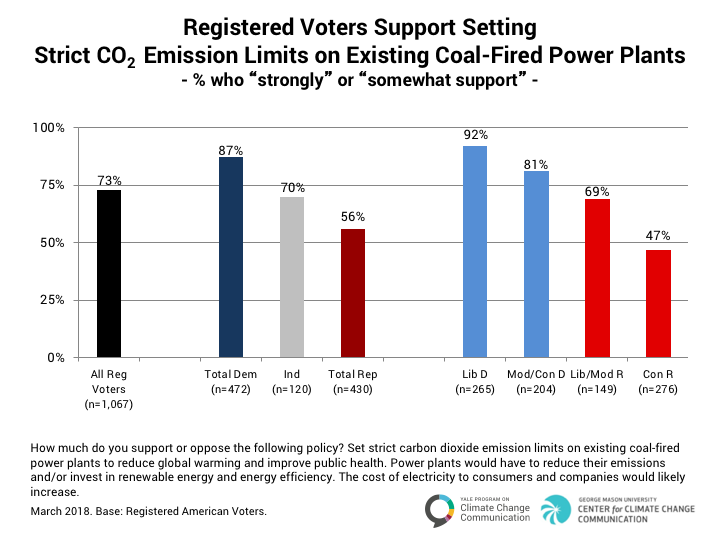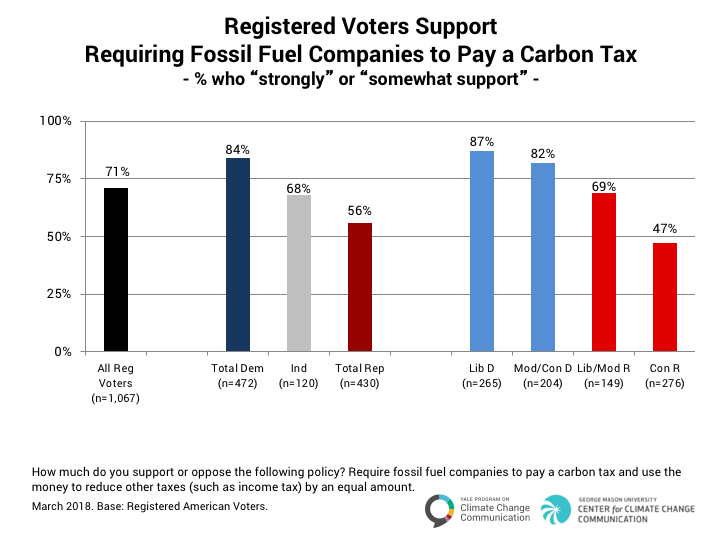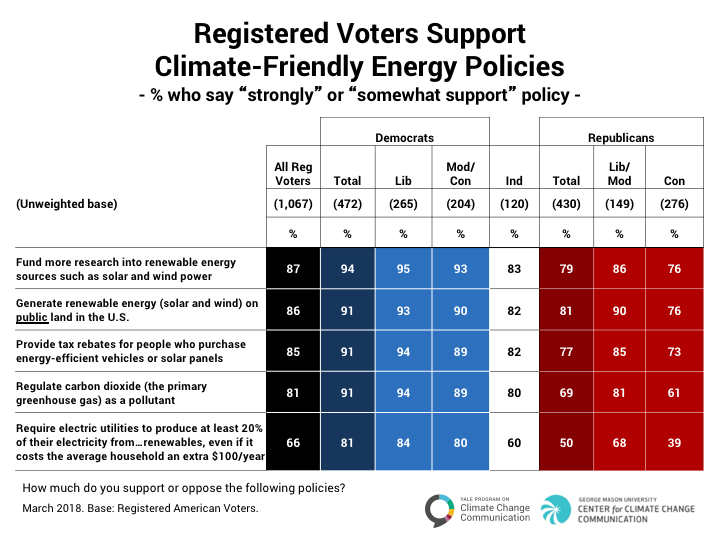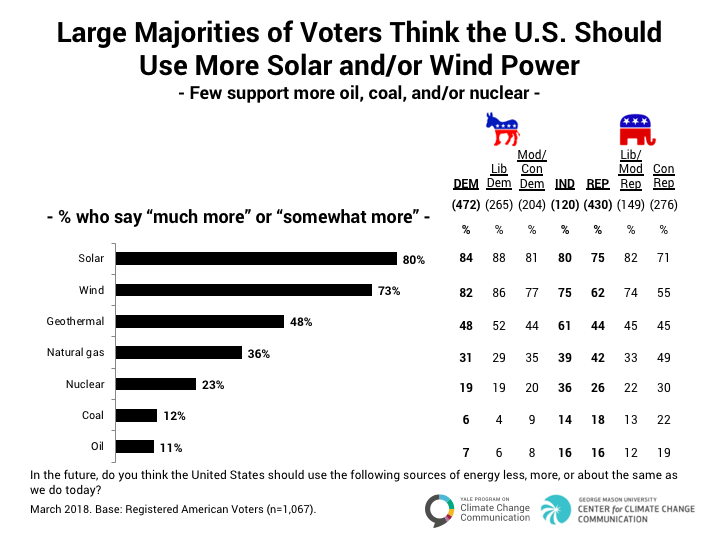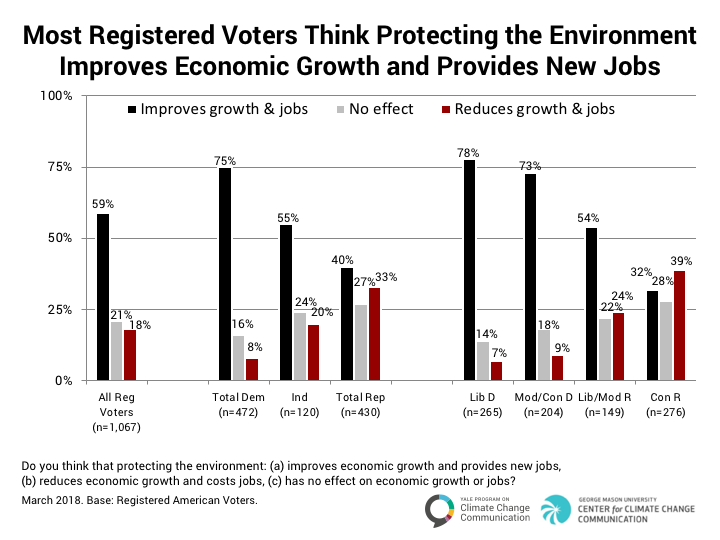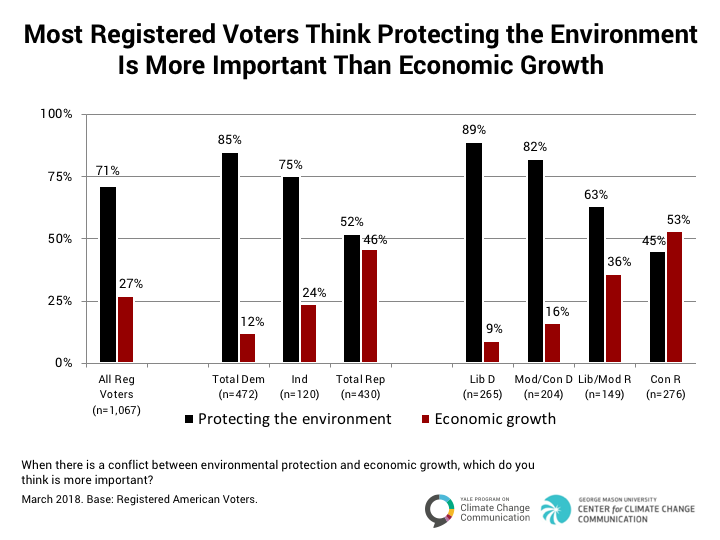Report · May 8, 2018
Politics & Global Warming, March 2018
By Anthony Leiserowitz, Edward Maibach, Connie Roser-Renouf, Seth Rosenthal, Matthew Cutler and John Kotcher
Filed under: Policy & Politics
4. Support for Policies to Address the Pollution that Causes Global Warming
4.1. Registered voters support setting strict carbon dioxide emission limits on coal-fired power plants.
Nearly three in four registered voters (73%) support setting strict carbon dioxide emission limits on existing coal-fired power plants to reduce global warming and improve public health, even if the cost of electricity to consumers and companies would likely increase.
A majority of Democrats (87%) and Independents (70%) support setting strict limits on coal-fired power plants. A majority of Republicans (56%, nine percentage points higher than in October 2017; see Data Tables), including about seven in ten liberal/moderate Republicans (69%, +5 points) and nearly half of conservative Republicans (47%, +10 points), also support such limits.
4.2. Registered voters support requiring fossil fuel companies to pay a carbon tax.
About seven in ten registered voters (71%) support requiring fossil fuel companies to pay a carbon tax and using the money to reduce other taxes (such as income tax) by an equal amount – a plan often referred to as a “revenue neutral carbon tax.”
A large majority of Democrats (84%) and two in three Independents (68%) support requiring fossil fuel companies to pay a carbon tax. A majority of Republicans (56%, seven percentage points higher than in October 2017; see Data Tables), including about seven in ten liberal/moderate Republicans (69%; +9 points) and nearly half of conservative Republicans (47%; +4 points), also support such a tax.
4.3. Registered voters support climate-friendly energy polices.
Registered voters support climate-friendly energy policies, including many designed to reduce carbon pollution and dependence on fossil fuels, and to promote clean energy. Democrats are the most likely to support such policies, but majorities of Independents and Republicans do as well. Majorities across the political spectrum support:
- Funding more research into renewable energy sources: 87% of registered voters, 94% of Democrats, 83% of Independents, and 79% of Republicans.
- Generating renewable energy on public land in the United States: 86% of registered voters, 91% of Democrats, 82% of Independents, and 81% of Republicans.
- Providing tax rebates to people who purchase energy-efficient vehicles or solar panels: 85% of registered voters, 91% of Democrats, 82% of Independents, and 77% of Republicans.
- Regulating carbon dioxide as a pollutant: 81% of registered voters, 91% of Democrats, 80% of Independents, and 69% of Republicans.
Majorities of conservative Republicans support funding more research into renewable energy (76%), generating renewable energy on public lands (76%), providing tax rebates to people who purchase energy-efficient vehicles or solar panels (73%), and regulating carbon dioxide as a pollutant (61%).
4.4. Registered voters are split on fossil-fuel production policies.
About half of registered voters (49%) support expanding offshore drilling for oil and natural gas off the U.S. coast, including 73% of Republicans, 43% of Independents, and 31% of Democrats. Fewer registered voters (45%) support drilling and mining for fossil fuels on public land in the United States, including 69% of Republicans and 35% of Independents, but only 27% of Democrats.
By contrast, fewer registered voters (32%) support drilling for oil in Alaska’s Arctic National Wildlife Refuge (ANWR), while a large majority (66%) oppose it (see Data Tables). More than half of conservative Republicans (59%) support this policy, but liberal/moderate Republicans (43%), Independents (28%), and Democrats (15%) are much less likely to support oil drilling in ANWR.
4.5. Large majorities of voters think the United States should use more solar and/or wind power. Few support more oil, coal, and/or nuclear.
Across the political spectrum, a majority of registered voters say that in the future, the United States should use more renewable sources of energy including solar (80% of all registered voters; 84% of Democrats, 80% of Independents, and 75% of Republicans) and/or wind (73% of all registered voters; 82% of Democrats, 75% of Independents, and 62% of Republicans). About half of registered voters (48%) say the United States should use more geothermal energy, but about one in four (26%) responded that they “don’t know” (see Data Tables).
In contrast, only about one in ten registered voters think the United States should use more fossil fuels, including coal (12% of all registered voters; 6% of Democrats, 14% of Independents, and 18% of Republicans, including just 22% of conservative Republicans) and/or oil (11% of all registered voters; 7% of Democrats, and 16% of both Independents and Republicans, including just 19% of conservative Republicans). More think the United States should use more natural gas (36% of all registered voters; 31% of Democrats, 39% of Independents, and 42% of Republicans).
About one in four registered voters (23%) think the United States should use more nuclear energy (19% of Democrats, 36% of Independents, and 26% of Republicans).
4.6. Most registered voters think protecting the environment improves economic growth and provides new jobs.
A majority of registered voters (59%) think protecting the environment improves economic growth and provides new jobs. An additional 21% think protecting the environment has no effect on economic growth or jobs. By contrast, only 18% think protecting the environment reduces growth and costs jobs.
Democrats are the most likely to think that protecting the environment improves growth and jobs (75%). More than half of Independents (55%) and four in ten Republicans (40%, including 54% of liberal/moderate Republicans) also agree. Conservative Republicans are less likely to think protecting the environment improves growth and jobs (32%), but only four in ten think protecting the environment reduces economic growth and jobs (39%).
4.7. Most registered voters think protecting the environment is more important than economic growth.
When there is a conflict between environmental protection and economic growth, 71% of registered voters think environmental protection is more important. This is true across most of the political spectrum, including a large majority of Democrats (85%), three in four Independents (75%), and more than half of Republicans (52%, 63% of liberal/moderate Republicans). Only conservative Republicans think economic growth is more important – although just over half (53%) think so, while just under half (45%) think environmental protection is more important.
4.8. Four in five registered voters say schools should teach children about global warming.
The Next Generation Science Standards for K-12 STEM (Science, Technology, Engineering, and Mathematics) education in the United StatesThe Next Generation Science Standards were developed by a collaboration of scientists and educators at the National Research Council of the National Academy of Sciences; the American Academy for the Advancement of Science; the National Teacher’s Association; 26 states; and Achieve (a non-profit organization). Released in 2013, the standards represent the most current, research-based method of educating K-12 students in STEM and preparing them for STEM careers. See: http://www.nextgenscience.org/ require that climate change be included in the curriculum, a mandate that is controversial in some parts of the country.
A large majority of registered voters (81%) support schools teaching children about the causes, consequences, and potential solutions to global warming. Support spans the political spectrum with nearly all Democrats (94%), four in five Independents (81%), and about two in three Republicans (65%, including a majority of conservative Republicans – 55%) saying they support teaching about global warming.
